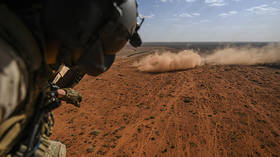NATO expansion towards Russian borders ‘one of the potential threats’ to us but Moscow is ready to talk – Putin
Russian President Vladimir Putin has said that NATO getting closer to the nation’s borders poses a threat to the country, as the alliance keeps beefing up military might and citing Moscow as a perceived threat.
Speaking at a defense-themed event on Tuesday, Putin said that NATO’s outdated “bloc-focused” way of thinking cannot serve as a “good instrument for making effective decisions” in the present-day world.
Also on rt.com NATO at 70: Sclerotic & bureaucratic zombie should be pensioned offThe president was commenting on the NATO summit, currently under way in London, where the bloc’s members gathered to celebrate its 70 anniversary.
Today we must consider the fact that the enlargement of NATO and the development of its military infrastructure near our borders is one of potential threats to the security of our country.
The Russian leader said that the US-led alliance did not stop admitting new member states even after the Cold War ended with the breakup of the USSR.
As we know, the Soviet Union doesn’t exist anymore, and neither does the Warsaw Pact military bloc, which was created [by the USSR and its allies in Eastern Europe] in response to the creation of NATO. But NATO not only continues to exist, it continues to develop.
The Russian leader emphasized, however, that Moscow, just like it had done in the past, remains ready to partner with NATO on solving “actual challenges,” like terrorism, local armed conflicts, and the proliferation of weapons of mass destruction.
The Western military bloc has admitted 13 new members since the end of the Cold War, a number of whom are former Socialist states. Moscow has vehemently opposed this move since the 1990s, insisting that the expansion of the alliance undermines its security and creates tension in Europe.
Also on rt.com Indispensable or obsolete? Reheated Cold War rhetoric can’t patch fractured NATO that lacks sense of purpose & vision for futureAlthough enjoying growth, the alliance has run into mounting internal problems and increasing tensions between its members lately. Ahead of the anniversary summit, French President Emmanuel Macron said the alliance was experiencing “brain death,” while expressing doubts over Washington’s commitment to the bloc. The French president has reasons for such doubt as his US counterpart Donald Trump repeatedly attacked NATO member states for not paying their “fair share” for collective defense and Washington’s “protection.”
The “brain death” remark angered many NATO members, who insisted the alliance was actually alive and vigorous. Turkey – which has the second largest military within the bloc – was particularly active in criticizing Macron, accusing him of “supporting terrorism.”
Ankara for its part has further issues with NATO, refusing to sign a new defense plan for the Baltics and Poland, and demanding the bloc’s “unconditional” support for its operation against Syria’s Kurdish-led militias. The offensive was previously overwhelmingly condemned by other member-states of the bloc.
Like this story? Share it with a friend!













